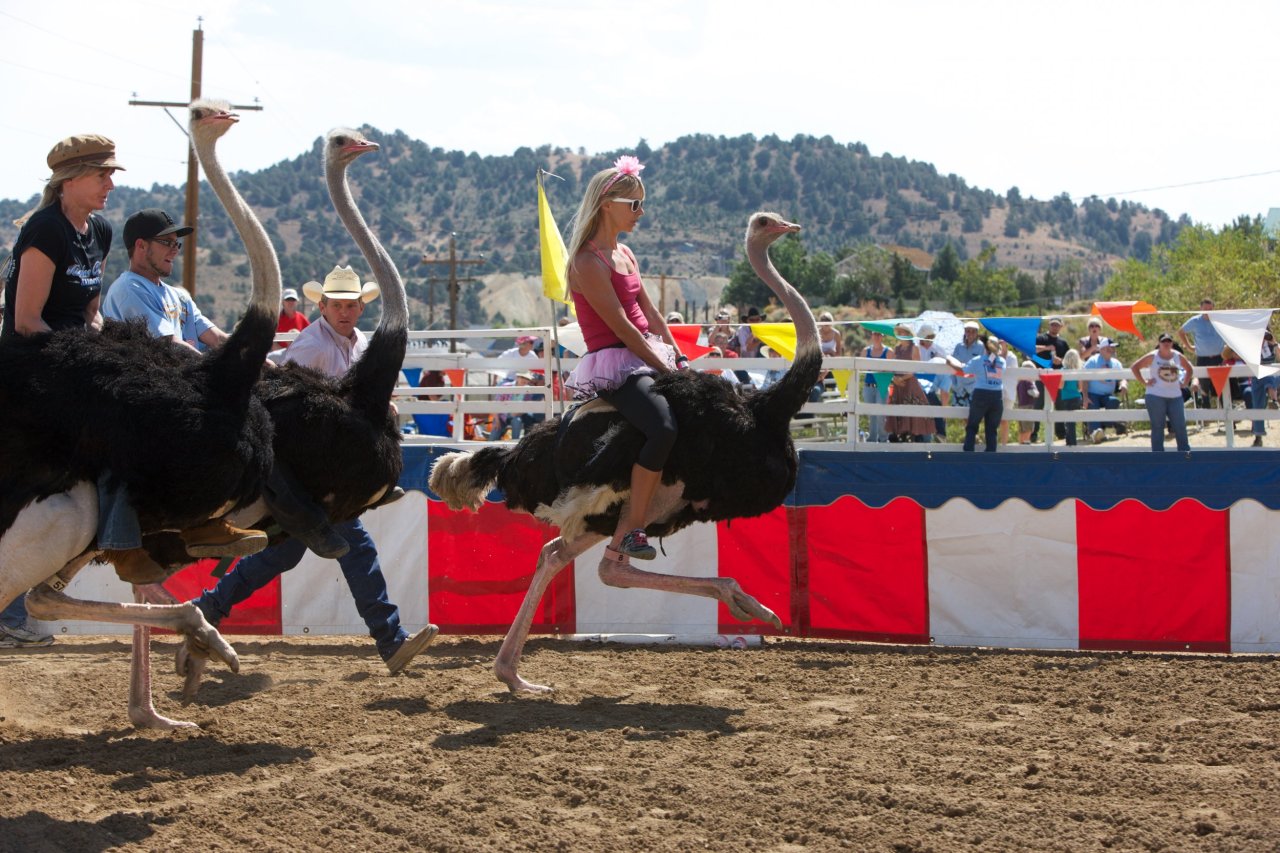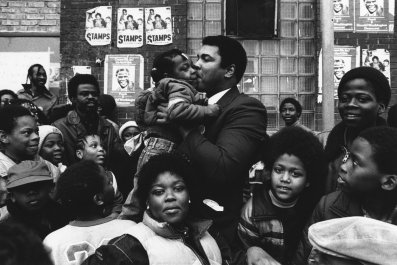It was a spectacle, all right. The 100th running of the Indianapolis 500, which was staged over Memorial Day weekend, marked the first sellout in the history of what is known as The Greatest Spectacle in Racing. Approximately 350,000 people witnessed rookie driver Alexander Rossi taking the checkered flag in Speedway, Indiana, making it the largest attended single-day sporting event in history.
Or was it? Speedway, a suburb of Indianapolis, is a town of fewer than 15,000 whose roads are not ideally suited to accommodate the sudden influx of thousands of vehicles of all sizes. Cars, trucks and RVs arranged bumper to bumper snaked in lines 2 miles long outside the Indianapolis Motor Speedway. Thus, an attendee of this latest Indy 500 sat in hours of traffic in the pursuit of watching hours of traffic. Where does commuting end and sport begin?
"We think it's a sport if the machine is a car?" asks David Goldblatt, author of The Games: A Global History of the Olympics. "Why have we invested so much of our identities in the internal combustion engine? I've never heard anything so ridiculous in all my life."

To be fair to Goldblatt, a cheeky Brit, he was discussing Formula One racing, a close cousin of IndyCar racing. And to be fair to auto racing, we are not here to vilify its worthiness as a sport. Rather, we come to ask a more rudimentary question: What is sport?
Last month, ESPN, the self-proclaimed "Worldwide Leader in Sports," televised both the Indy 500 and the Scripps National Spelling Bee, as it has done for years. Next month, it will air both the World Series of Poker and the Nathan's Hot Dog Eating Contest. This month, ESPN is airing the NBA Finals and a plethora of Major League Baseball, both "traditional" sports, but are they any more or less valid than the aforementioned endeavors?
"Does it matter?" asks Scott Van Pelt, host of ESPN's midnight SportsCenter telecast. "If people are enjoying, if they are keeping score, isn't that enough?"
Two summers ago, ESPN3 streamed the world championships of Dota 2, a popular video game, that were being held in front of 17,000-plus fans at KeyArena in Seattle. In September of that year, ESPN President John Skipper famously said of the event, "It's not a sport—it's a competition. Chess is a competition. Checkers is a competition. Mostly, I'm interested in doing real sports."
Skipper's words drew a generational line in the sand. Two months earlier, the United States government had decided to grant professional gamers, as they are known, the same travel visas it grants to professional athletes. Uncle Sam says esports are a sport, even if the head of the Worldwide Leader in Sports disagrees with him. And Skipper's not the only one. "Gamers, you know, pffft," says Goldblatt, who teaches a course on the Olympics at Pitzer College in Claremont, California, where many of his students are esport enthusiasts. "Are they sports? It's just like, thumbs, man. Esports is just people using their thumbs. I'm not enjoying the thumbs."
Cheese-rolling. Pole-vaulting. Wife-carrying. Figure skating. Cup-stacking. Bobsledding. Ferret-legging. Golf. Somewhere someone right now is endeavoring to become more proficient at every one of these activities. Half the sports on that list are imbued with the prestige and promise of an Olympic medal, but is there anything more intrinsically worthy about performing a triple salchow than there is about keeping an angry ferret inside your trousers for two minutes?
The upcoming Summer Olympics from Rio de Janeiro will feature 306 different events in 42 sports, or so the official Rio2016.com site tells us. But how many of those sports, such as synchronized swimming or equestrian events, do you consider a sport? "If someone invented gymnastics today," says Goldblatt, "it would just be a specialized form of Zumba."
Each of us brings our biases and tastes to the question of whether any activity is a sport. Most of us require less time to decide than Stephen Curry needs to get off a three-pointer. "Chess is as pure a sport as there is because it is in no way left up to the judgment of other people," says Tim Crothers, a former senior writer at Sports Illustrated who teaches sports journalism at the University of North Carolina. "At the bottom of the barrel, you have figure skating, which is just an exhibition judged by people we have no trust in."
Crothers is adamant that chess is a sport, while Amelia Boone, the world's premier female obstacle racer, is just as adamant that it is not. How about a cheerleading contest? "Yes," says Boone.
"In high school, I wrote a column titled 'Cheerleading Is Not a Sport,'" says best-selling sports book author Jeff Pearlman. "The next day in the cafeteria, I was surrounded by a group of angry cheerleaders. That was the greatest thing, to that point in my life, that had ever happened to me."
Pearlman does not believe golf is a sport, but Van Pelt, a former Golf Channel studio host, insists it is. "Before you even factor in striking the ball, just walk 7,500 yards in one afternoon," he says, "and see how sore you'll be the next day. Oh, and then I'll play poorly on top of that.
"A spelling bee is not a sport, though. For starters, it's an antiquated skill. If I spell something incorrectly, a red line just pops up under the word."
"How can a spelling bee be a sport?" asks Goldblatt. "Even Stephen Hawking can win a spelling bee."
Angela Gleason teaches a seminar at Yale University titled History of Sport, and she approaches the course with the objectivity of a scholar. Each semester, she opens class with the same succinct speech. "Whatever we discuss, you'll never know if it is my opinion or not. Except for one thing: I feel very strongly—it is not just my opinion but also my conviction—that NASCAR is not a sport."

Does Sex Count?
George Costanza: And then, as I watched him struggling, I realized something was obstructing its breathing. From where I was standing, I could see directly into the eye of the great fish—
Jerry Seinfeld: Mammal.
Costanza: Whatever.
You may recall the classic scene from Seinfeld in which Costanza relates how he removed the golf ball Kramer had hit into the surf that was obstructing the blowhole of a whale. The scene relates to sports on a surface level—no pun intended—but also on a more philosophical plane.
Consider the whale. It lives in the ocean. It swims. It has fins. Whales are aquatic creatures, and yet most of us, marine biologists or not, know whales are mammals. Whales are classified as mammals because in the 18th century, Swedish botanist Carl Linnaeus, the "father of modern taxonomy," created an objective system for classifying plant and animal life based on a hierarchy of traits. Whales are mammals because they are warm-blooded, have glands to produce milk for their young and possess a four-chambered heart, all of which Linnaeus observed were more fundamental shared traits than, say, being an attraction at SeaWorld (an aside: The documentary Blackfish is a huge misnomer).
Moby-Dick and the shark in Jaws may have been great and white and the object of someone's obsession, but taxonomically, Captain Ahab's whale had more in common with King Kong. And no one disputes that because Linnaeus's system of classification is universally accepted in the scientific community. In the sports community, on the other hand, denizens cannot even come to a consensus on what is a strike, or traveling, or even if O.J. did it (he totally did it; c'mon!). The National Football League is nearing its centennial—2020—and still haggling over what constitutes a catch.
Last summer, I was in a bar in Chatham, Massachusetts, in which two men far burlier than me were arguing over whether golf is a sport. When they learned that I write about sports for a living, the more menacing of the two said, "Great, you can tell him that golf is a sport."
Summoning all of my temerity, fully aware that I might be seconds away from being the loser in my first ultimate fighting match, I said, "But golf isn't a sport."
We will get to why I said that—and how many stitches I needed—later. First, let's accept that very few people are able to provide a succinct definition of sport, while matter is defined as "anything that has mass and volume." There it is, the entire universe in six words—but defining sport is impossible?
Second, let's acknowledge that almost everyone is able to declaratively opine, and with great conviction, on the validity of a sport. Competitive eating? "Absolutely not," says Boone.
"No!" agrees Van Pelt. "There's nothing more American than sanctioned gluttony, it's the most American thing there is. But it's not a sport."
Finally, let's understand that if most of us feel comfortable pronouncing an activity as a sport or denouncing it as not one, then we must possess a subconscious, perhaps even instinctive, knowledge of what constitutes sport. "This reminds me of the case on pornography," says Boone, who is an attorney at Apple. "I can't define it, but I know it when I see it."
Pornography, by the way, is not a sport. Yet.
Gary Belsky, former managing editor of ESPN the Magazine and co-author (with Neil Fine) of On the Origins of Sports, says, "You don't need a definition of sports. It's more quantum physics, like the Heisenberg Uncertainty Principle. There are simply too many variables."

But what if you did have to define it? Let's give Dan Lebowitz, the executive director of the Center for the Study of Sport in Society in Boston, a crack at it: "I'm big on 'Sport is a competitive endeavor that involves athleticism in which the goal is to win.'" Competition. Athleticism. Keeping score. That eliminates both chess and figure skating, if you believe that scoring should not be determined by a judge.
Those are three valid metrics, but why stop with Lebowitz? Let's make defining sport a sport, if you will. "There has to be an idea of a healthy connection, something that you are doing for your physical well-being," says Boone.
"There must be the acceleration of more than one limb simultaneously," says Goldblatt. "And let's not forget having fun."
"I have a definition that I believe in very much," says Gleason, who has dedicated much of her professional life to plumbing the why of sport. "Sport is our greatest expression of attaining or witnessing bodily excellence.
"Bodily excellence moves us the way beauty moves us," she explains. "I don't want to get all warm and jammy here, but I think it makes us proud to be human. There's no doubt in my mind, at the bottom of this is that we all appreciate excellent bodies."
I Win, Therefore I Am
Let's take another run at fun. "It's a summer day, and a bunch of 8-year-olds are sitting around with nothing to do," says Crothers, a father of two. "Eventually, they're going to figure out a competition. And I think that goes back to the beginning of time."
When Boone was an associate at a Chicago law firm, she used to time herself walking from her condo to her office each morning. "People walking on the other side of the street had no idea they were racing me," says Boone, who finished first in her law school class. "There are some people who really don't have a competitive bone in their bodies. Sometimes, I'm kind of jealous of those people."
Pearlman never visits a diner with his son without engaging in a contest to build the taller sugar-packet castle. "I don't know any other animal that wants to win for the sake of winning," says Pearlman, a former senior writer at Sports Illustrated. "You know why they have jockeys in the Kentucky Derby? Because horses don't look at one another and say, 'Let's race!'"
However, all mammals do, to varying degrees, compete for sexual primacy. Gleason suggests that most other mammals do not keep score "because they don't have hands," but how far apart are two rams locking horns from the climactic drag race scene in Grease? Is there a connection in the fact that former Los Angeles Lakers center Wilt Chamberlain put up numbers involving both backboards and headboards that more than half a century later remain unattainable?
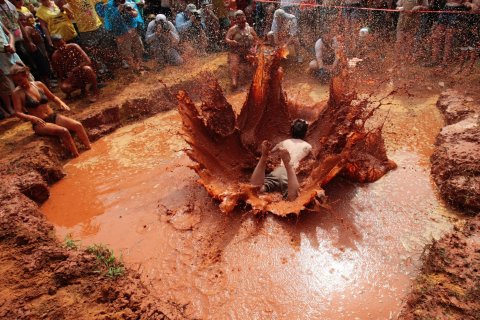
Athletic prowess relates to sexual prowess, and opportunity, which extends back to the dawn of man and the most primal of urges. No one is suggesting that fifth-grader Nihar Janga or seventh-grader Jairam Hathwar, the recently crowned co-champions of the Scripps National Spelling Bee, are going to make it rain at the club any time soon, but certainly their "Bee All That You Can Bee" moment has enhanced their self-esteem.
"Sports decides who is best," says Gleason. "One thing that has always interested me is why faculty members hate sports so much. I think there's a deep resentment among many of my colleagues. They could write a book that would change the scope of art history, but the fact that they can't make a foul shot is all that matters."
Competition is fun. Suspense is fun. "We like suspense," says Boone.
"I will watch any game, any sport, anytime, anywhere that is coming down to the last second and the outcome is undecided," says Crothers. "Then I'm in. I don't care if it's underwater tiddlywinks."
Remember that riveting film about the team heavily favored to win that did so without any adversity? You don't? That's because it has never been made. We play sports because we crave suspense, which is delivered by one of two means: a struggle between two or more combatants who are evenly matched (Rocky Balboa vs. Apollo Creed) or one in which a participant is doing something historically unprecedented, be it good (Secretariat clinching the Triple Crown by winning in the 1973 Belmont Stakes by 31 lengths) or bad (Jean van de Velde blowing a three-shot lead on the final hole of the 1999 British Open).
"Ernie Els, one of the best golfers in the world, six-putted the first hole at the Masters earlier this year," says Crothers. "How could you not be captivated by that?"
Dan Shaughnessy, a sports columnist for The Boston Globe, created a ruckus earlier this spring when he tweeted that the University of Connecticut women's basketball team, in the midst of a 75-game winning streak (their third winning streak this century of 70-or-more games), was not watchable. Shaughnessy was called a curmudgeon and a misogynist, but to an extent he was correct. The Huskies, who regularly win contests by 50 points, are not "watchable" from a sports perspective. They are only watchable from an artistic perspective. There was very little suspense to watching Salvador Dali paint, but the end product was a masterpiece.
Making Sport of Trump
In 1896, Pierre de Coubertin, a French baron, resurrected the ancient Greek Olympic games, which had been dormant for a few millennia, as a quadrennial showcase of sport. Before the 1912 Stockholm Olympics, de Coubertin attempted to persuade the Swedish officials to stage artistic, literary and musical competitions in which medals would be awarded.
The hosts demurred, but as the father of the modern Olympics, de Coubertin overruled them (Does anyone refuse Lorne Michaels a cameo on Saturday Night Live ?). He then solicited submissions and announced that he would judge these competitions. In the poetry event, an ode to sport won the gold medal, and below is its opening stanza:
O Sport, pleasure of the Gods, essence of life!
You appeared suddenly in the midst of the grey clearing which writhes
With the drudgery of modern existence.
—Georges Hohrod and Martin Eschbach
It may not surprise you to learn that Hohrod and Eschbach were not the era's most potent poetry-penning pair, but rather a pseudonym for...Pierre de Coubertin. The father of the modern Olympics awarded himself a gold medal minus any real competition, a matter of verse over versus. "The idea of writing as a competition is absurd," says Goldblatt, a prolific author. "Jim Thorpe won only one more gold medal than de Coubertin in Stockholm. He must have thought, You silly people."
Linnaeus performed taxonomy by identifying elemental distinguishing traits: Some creatures are warm-blooded and others are cold-blooded. Some give birth to live offspring and others lay eggs; some have feathers and others have hair. Is it possible to taxonomize sports—and to a more rudimentary degree than the International Olympic Committee announcing that there will be 42 sports comprising 306 events in Brazil?
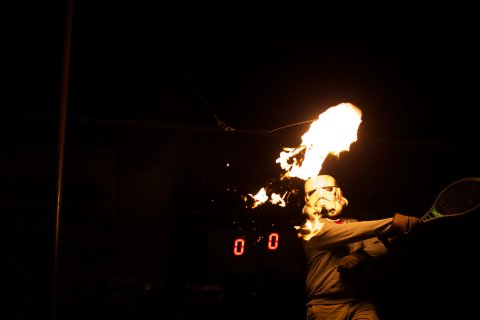
We must try, and we will begin by being all-inclusive (for the moment, you're in, wife-carrying and chess). Some sports require participants to play defense. Some sports require athleticism. Some sports are decided by judges. Some sports are ruled by a clock. Some involve inhaling mass quantities of food and—no, sorry—you're out, competitive eating.
"The problem is, what is and what isn't a sport is decided by a collective consciousness," says Goldblatt. He's right. Two thousand years ago, people recognized rowing as slave labor: If you and a group of colleagues were pulling oars in synchronicity, you were probably shackled together on a Roman trireme. Nowadays, incorporating the same talents, you can be a gold-medal winner. Is cotton-picking up for discussion for the 3008 Olympics? It sounds absurd, even offensive, to suggest as much, but no more than heavyweight eights would to Ben-Hur.
The other problem is passion. Sports are a reservoir of passion, and thus any suggestion that certain popular sports are in fact merely athletic activities will instantly be met with defiance by that sport's ardent fans. Where, however, do we draw the line? If auto racing is a sport, why not vacuum cleaning? "I don't think there's much of a future, as a spectator sport, in pushing an Electrolux around," says Goldblatt.
But what if there were? Is an activity a sport simply because it features competition and can attract huge crowds and/or television ratings? And if so, when will SportsCenter begin covering the 2016 presidential election? "This election has been packaged just like a sports event," says Van Pelt. "The map of the United States is the scoreboard, and the team colors are red and blue. The polarization, that's nothing new to sports fans. You're as likely to see a guy in a "Make America Great Again" hat vote for Hillary as you are to see a guy in Crimson Tide gear shout 'War Eagle!' There's an element of sport to it."
True, but there is also an element to sport of love and war where, like professional wrestling (not a sport), all's fair. Eventually we arrive at this conundrum: If every competition is a sport, are we not devaluing the term? "Why do I really care?" asks Boone. "If poker is or is not a sport, that's not going to keep me up at night."
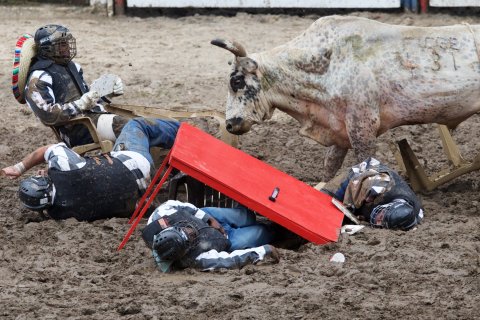
But it will keep me up at night, which is why I risked the welfare of my proboscis at that bar last summer to overrule a burly stranger. And so, not unlike a certain promotional HBO ad featuring Bill Simmons, allow me to tell you what I believe. I believe that a sport must be (1) a competition of undetermined outcome (thereby eliminating pro wrestling and the Democratic primary) that has (2) codified rules, (3) a pronounced element of athleticism and (4) defense.
Yes, defense. Baseball, basketball, football, hockey, tennis, water polo, rugby, ultimate fighting, etc. are all sports. Swimming, golf, marathoning, the 100-meter dash—even the Tour de France—are all athletics. Sports are athletics, but all athletics are not sports.
"I don't agree with that," says Van Pelt, who fondly recalls playing "Kill the Guy With the Ball" as a lad in Montgomery County, Maryland. "The most exciting nine-and-a-half seconds this summer are going to be when Usain Bolt hears the gun in the men's Olympic 100-meter final."
Van Pelt may be right. However, there is nothing, at least not in my taxonomy, that puts sports on a higher stratum than athletics. It's simply that there is a basic difference between an athletic competition in which your opponent is directly and physically thwarting your progress and those that do not feature that component.
"Ultimately, sports can be thought of as a game of competing against one another with an aspect of territorial acquisition or invasion," says Belsky. "So in that way, I can see your point. But there's another adage that may fit just as well: It's a sport if ESPN covers it."
Back in Cape Cod, I offered my potential assailant at the bar this analogy. Line two competitors up side by side on a shooting range and it's a competition. Line them up at opposite ends of that shooting range, facing each other, and now we have a sport.



